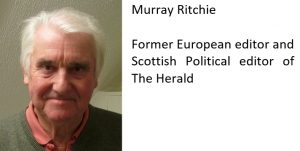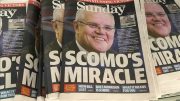Could England become independent as Scotland quits the UK? Murray Ritchie says emboldened nationalists are now showing renewed optimism amid growing signs of impatience with their first minister’s caution.
The SNP always argued – and prayed – that watching the Tories drag Scotland out of the European Union against the expressed will of the electorate north of the border would propel the country to independence.
But some new development was needed to shift the stubborn opinion polls showing support for independence stuck at 45 per cent and unchanged since 2014.
The Scottish National Party’s walkout from the Commons last week might just have provided that change. In the 48 hours that followed the protest its membership soared by more than 7,500, according to a celebrating Nicola Sturgeon, the SNP leader. By now it is probably even more.
Some caution is required with that number. Obviously, those who felt compelled to join the party because of Tory intransigence in Westminster will already be Yes supporters. But the swing required by Yessers in the coming Indyref2 is small. Just over 5 per cent would do the trick.
The SNP are counting on some No voters having switched sides. Just how many is unknown so far because polling since the protest has been almost non-existent.
Unionists are desperate to dismiss last week’s walkout as a political stunt – which it undoubtedly was – but one man’s stunt is another man’s successful protest.
What seems likely is that by reclaiming powers from the Scottish Parliament against bitter cross-party opposition in Holyrood the UK Tories have presented Ms Sturgeon with a gift.
If the row changed anything it probably consigned to history Ms Sturgeon’s mis-step last year in declaring and then postponing a new independence poll in light of disappointing general election results.
Emboldened nationalists are now showing renewed optimism amid growing signs of impatience with their first minister’s caution. We know Indyref2 is on the horizon. The only question now is when it will be called.
And it will probably have to come within two years because beyond then there could conceivably no longer be a majority for independence in the Scottish Parliament.
The strange dearth of opinion polling on independence in Scotland these days must make Ms Sturgeon curious, even a little uncertain. Where are these polls?
There was a time not so long ago when Scotland and Scottish politics were almost polled to death. But, for whatever reason, there seems to have been loss of interest, perhaps because of a preoccupation with Brexit and the divisions it has opened in England.
In these puzzling political times no-one really knows for sure how the Brexit shambles is affecting Scottish opinion. But such a huge and sudden leap in SNP membership must signify something good for the nationalist cause. The SNP might still be split on Brexit, with one third of nationalists supporting UK withdrawal from the EU – but they are still united in wanting independence.
Unionists are desperate to dismiss last week’s walkout as a political stunt – which it undoubtedly was – but one man’s stunt is another man’s successful protest.
So far Ms Sturgeon, mindful of Scotland voting two to one for Remain, has shown no inclination to separate independence from Brexit in the coming independence re-run.
Until last week the Scottish electoral split on independence reflected the English division on Brexit. In such a bitter argument those who supported one side don’t like to admit they just might have made a mistake.
A few perhaps have grudgingly confessed to regrets over voting for Brexit but there is no discernable mass move to Remain.
In Scotland much the same applies with independence. Until last week those who voted No (55 per cent) appeared to be sticking to their decision. That might now be changing.
A Brexit gone wrong has long been held as a boon to the SNP and no-one believes at present that a good outcome is in prospect. How a bad outcome plays with Brexit-supporting Scots in Indyref2 will be critical to the outcome.
So far Ms Sturgeon, mindful of Scotland voting two to one for Remain, has shown no inclination to separate independence from Brexit in the coming independence re-run.
Some want her to call Indyref2 on the understanding that the EU question will be dodged and left for another day when Scotland has to vote again on whether to resume its place in Brussels.
Until that decision is reached the debate will be more on economics. Last time the SNP lost the economic argument and they don’t want a repeat. Yessers now believe Brexit can only assist their case.
The SNP’s recent Growth Commission study suggested a more downbeat assessment of Scotland’s economic challenges under independence.
Yessers simply interpret this as “realism” while No supporters continue to cling to the view that Scotland is still too small to survive economically. It is difficult to see Brexit boosting that argument.
Yet if Brexit Britain is to be as wretched a basket case as the doomsayers predict then Scotland would, obviously, be far better off jumping into the EU safety net.
But that is for the future. Right now, one unarguable fact encourages the first minister. In Indyref1 the Yes campaign started with percentage support in the polls ranging from the low 20s to low 30s. It turned out to be 45 per cent.
All the evidence now suggests the starting point for Indyref2 will show Yes support on 45 per cent at least. That is a mighty springboard for such a small required swing.
Ms Sturgeon has always said she will hold Indyref2 only when she thinks she can win – and not before.
Already the Yes troops are restless as they organise conferences and public meetings and marches with impressive turnouts across Scotland, all without waiting for the first minister’s blessing.
Not all of them are necessarily inclined to accept or even wait for Ms Sturgeon as their unquestioned leader.
Her challenge now is to reconcile the impatient with the pragmatic. When the Brexit outcome is finally known we can expect some clarity in her plan for Scotland’s future.
Only then will we have a better idea how Scotland’s political and constitutional mood has developed. Ms Sturgeon’s time could be coming when she succeeds where Alex Salmond failed.





